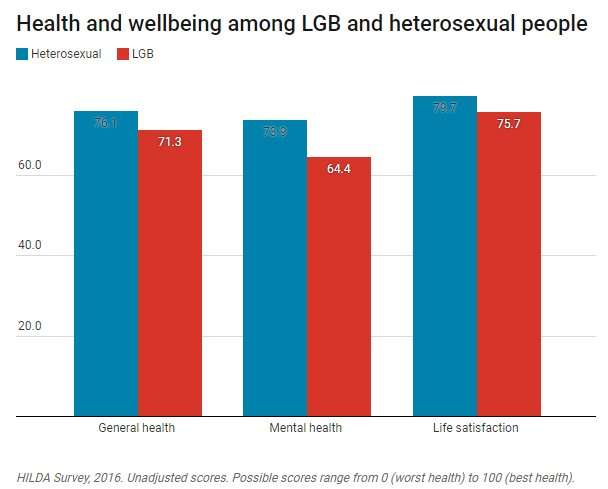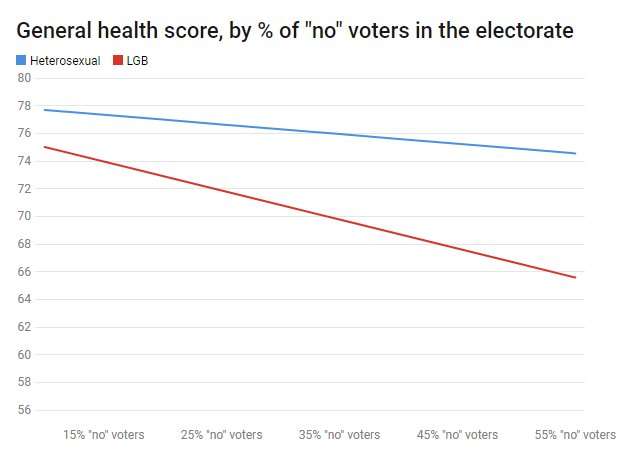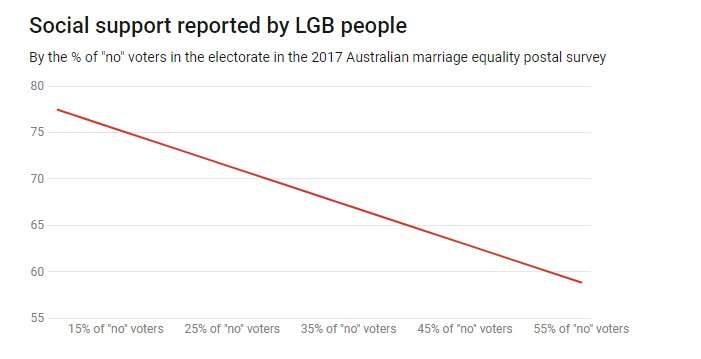How stigma impacts LGB health and wellbeing in Australia

Research in Australia and internationally has documented poor health and wellbeing among LGBTQI people compared to heterosexual people. What's less understood are the reasons why.
A dominant theory, the minority stress model, suggests that the discrimination and stigmatisation experienced by LGBTQI people in their everyday lives are to blame.
While several studies have been conducted to back up these claims in the US, my recent research with student Abram Todd at The University of Queensland is the first to examine this issue in Australia.
Mapping community levels of stigma
Our study is partially based on the results of the 2017 same-sex marriage postal survey, made publicly available by the Australian Bureau of Statistics.
We determined where stigmatisation of LGB communities might be highest by identifying those electoral divisions that recorded the highest shares of "no" voters—defined as the number of people voting "no" out of the total number of people in the electorate invited to vote. To determine areas with low stigmatisation, we tracked the electoral divisions with the lowest shares of "no" voters.
We then linked these electorate data to a national social survey of Australians aged 15 and older, the Household, Income and Labour Dynamics in Australia (HILDA) Survey. The HILDA Survey contains information on the sexual identity, health and wellbeing of 15,986 respondents, of whom 554 identified as lesbian, gay or bisexual. (The survey did not ask respondents whether they identified as transgender, queer or intersex.)

We examined the health and wellbeing of the people who responded to the survey using three standard measures:
- a general health scale,
- a mental health scale, and
- an indicator of life satisfaction.
For comparability, we scored all of these measures on a range from 0 (worst health or wellbeing) to 100 (best health or wellbeing).
How stigma matters
Consistent with previous research, LGB people in our study reported worse overall health, mental health and life satisfaction than straight people.
The key question is: to what extent do these health and wellbeing scores vary according to where people live and the levels of stigmatisation in their communities? To answer this, we factored in our proxy measure of stigma – the percentage of "no" voters in each electorate in the same-sex marriage postal survey.

Our findings portrayed a strong link between the two. LGB people living in electorates with smaller shares of "no" voters reported significantly better general health, mental health and life satisfaction than LGB people living in electorates with larger shares of "no" voters.
When comparing LGB and straight people in low-stigma communities, we found little to no difference in their health and wellbeing. However, differences were much larger when comparing LGB and straight people in high-stigma communities.
It is worth stressing that our estimates come from statistical models adjusting for a host of individual characteristics (such as age, gender or education) and electorate factors (such as unemployment rates and median income) that could otherwise bias the results.
Social support: A missing piece of the puzzle
In our study, we also tested whether perceived social support (friendships, good social relations and strong networks) contributed to the observed link between stigma and LGB health and wellbeing.
As we anticipated, we found LGB people living in electorates with higher shares of "no" voters received less social support than LGB people living elsewhere.

Additional statistical models revealed that these deficits in social support were key to explaining why LGB people fared worse in high-stigma areas.
What does it all mean?
Our findings are consistent with the notion that the disadvantage experienced by LGB people in society stems from social environments that are hostile to them.
Even within a relatively progressive country such as Australia, the lack of acceptance of LGB people and the dearth of social support that they receive are to a large extent responsible for their overall poor health and wellbeing.
Inclusive policies, such as the same-sex marriage provision, undoubtedly contribute to improving the visibility of LGB people and normalising their life experiences.
But more is needed to redress the social inequality experienced by the LGB community. As our research indicates, tackling cultural forms of stigma and providing commensurate social support to our LGB and heterosexual neighbours is part of the solution.
This article was originally published on The Conversation. Read the original article.![]()

















